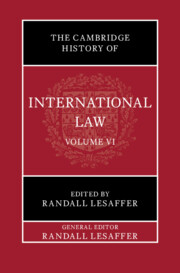Book contents
- The Cambridge History of International Law
- The Cambridge History of International Law
- Frontispiece
- The Cambridge History of International Law
- Copyright page
- Contents
- Plates
- Contributors
- Preface
- Abbreviations
- Part I International Law in Renaissance Europe (1492–1660)
- Part II International Law in Old Regime Europe (1660–1775)
- 12 The Law of Nations in Old Regime Europe
- 13 Territory and Jurisdiction in Old Regime Europe
- 14 The Law of the Sea in Old Regime Europe
- 15 War and the Use of Force in Old Regime Europe
- 16 Warfare on land in Old Regime Europe
- 17 Maritime Warfare in Old Regime Europe
- 18 Peacemaking in Old Regime Europe
- 19 Trade in Old Regime Europe
- 20 Diplomacy in Old Regime Europe
- 21 Dispute Settlement in Old Regime Europe
- 22 The Ottoman Encounter and the Law of Nations in the Old Regime
- Index
- Plate Section (PDF Only)
- References
12 - The Law of Nations in Old Regime Europe
from Part II - International Law in Old Regime Europe (1660–1775)
Published online by Cambridge University Press: 22 April 2025
- The Cambridge History of International Law
- The Cambridge History of International Law
- Frontispiece
- The Cambridge History of International Law
- Copyright page
- Contents
- Plates
- Contributors
- Preface
- Abbreviations
- Part I International Law in Renaissance Europe (1492–1660)
- Part II International Law in Old Regime Europe (1660–1775)
- 12 The Law of Nations in Old Regime Europe
- 13 Territory and Jurisdiction in Old Regime Europe
- 14 The Law of the Sea in Old Regime Europe
- 15 War and the Use of Force in Old Regime Europe
- 16 Warfare on land in Old Regime Europe
- 17 Maritime Warfare in Old Regime Europe
- 18 Peacemaking in Old Regime Europe
- 19 Trade in Old Regime Europe
- 20 Diplomacy in Old Regime Europe
- 21 Dispute Settlement in Old Regime Europe
- 22 The Ottoman Encounter and the Law of Nations in the Old Regime
- Index
- Plate Section (PDF Only)
- References
Summary
By the middle of the seventeenth century, a category of sovereign princes and polities had succeeded in monopolising jurisdiction over external relations and the internal machinery of government that allows to speak of sovereign state. The Old Regime saw the further emergence, in governmental and diplomatic practice as well as in learned writings of the paradigm of the law of nations as the preserve of sovereigns. As legal practice and literature, it also expanded in scope and mass to new regulatory fields such as the law of the sea, maritime warfare, neutrality or dispute settlement. The great treatises on the law of nations of the middle of the eighteenth century fleshed out the dualist system of law of nature and of nations that formed one of the intellectual backbones to Grotius’ work into an elaborate framework of the governance of international relations inside Christian Europe and for its imperial expansion outside.
- Type
- Chapter
- Information
- The Cambridge History of International Law , pp. 381 - 420Publisher: Cambridge University PressPrint publication year: 2025

